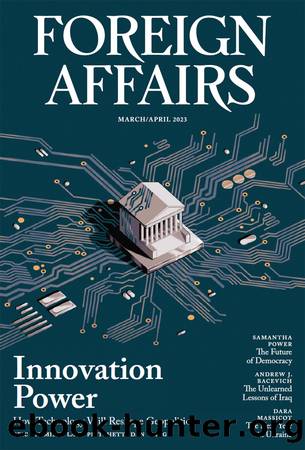Innovation Power: How Technology Will Reshape Geopolitics by Eric Schmidt & Lant Pritchett & Dan Wang

Author:Eric Schmidt & Lant Pritchett & Dan Wang [Eric Schmidt & Lant Pritchett & Dan Wang]
Language: eng
Format: epub, mobi
Publisher: Council on Foreign Relations
Published: 2023-02-09T00:00:00+00:00
GORDON H. HANSON is Peter Wertheim Professor in Urban Policy at the Harvard Kennedy School.
MATTHEW J. SLAUGHTER is Paul Danos Dean and Earl C. Daum 1924 Professor of International Business at the Tuck School of Business at Dartmouth College. He served as a member of the White House Council of Economic Advisers from 2005 to 2007.
Humanity must change its habits of consumption to limit greenhouse gas emissions. Replacing carbon-intensive goods and services with green counterparts (that is, products made with dramatically reduced or no carbon emissions) will help curb overall global emissions. Indeed, some of the worldâs leading climate voices are more openly acknowledging the necessity of such a transition. Last year, in an unusual move, the annual climate-assessment report of the UNâS Intergovernmental Panel on Climate Change included chapters on efforts to create new environmental goods and services. And promising discoveries have sparked hope for future progress. In December 2022, U.S. scientists announced the breakthrough, after decades of trying, of the first-ever controlled nuclear fusion reaction. Nuclear fusion technology, however, will not be commercially viable anytime soon.
The world cannot wait any longer to forestall the coming climate crisis. Countries must accelerate the invention and deployment of low-cost green products in key areas, including energy generation, distribution, and transportation. Chief among the needed policies is the implementation of a meaningful world carbon price, in the form of a charge on greenhouse gas emissions. Such a price would make new green products cheaper than existing carbon-intensive ones. Without it, the pace of any energy transition would continue to be alarmingly slow: inventors will not have sufficient financial incentive to make bold bets in their research and development, and companies will drag their feet in adopting existing green technologies.
But the prospect of a high and harmonized world price on carbon is not on the horizon. In the United States, for instance, imposing an economically meaningful carbon price is unfeasible, at least in the medium term. The political right derides carbon prices as an intrusive new form of taxation, whereas the political left sees them as tacitly condoning the continued use of fossil fuels.
A more immediate and practical solution would be a free trade agreement for green technology. Under the auspices of the World Trade Organization, countries should expedite necessary inventions and lower the cost of green products by establishing an accord that liberalizes trade in green-tech products, investment in environmental industries, and the immigration necessary to foster entrepreneurship and build skilled workforces. Think of this as a green technology version of the Information Technology Agreement (ITA), a WTO deal initially signed by 29 countries in 1996 that eliminated tariffs on hundreds of information technology (IT) goods. Governments have struggled to muster the necessary political will and capacity to address the climate crisis. It is time to allow the global market to speed the transition to a green economy.
Download
Innovation Power: How Technology Will Reshape Geopolitics by Eric Schmidt & Lant Pritchett & Dan Wang.mobi
This site does not store any files on its server. We only index and link to content provided by other sites. Please contact the content providers to delete copyright contents if any and email us, we'll remove relevant links or contents immediately.
The Year in Tech, 2024 by Harvard Business Review(319)
Killer Thinking by Tim Duggan(241)
The Year in Tech, 2025 by Harvard Business Review(235)
Transforming Entrepreneurship Education: Interdisciplinary Insights on Innovative Methods and Formats by Jantje Halberstadt Antonieta Alcorta de Bronstein Jean Greyling Shaun Bissett(214)
Containing Big Tech: How to Protect Our Civil Rights, Economy, and Democracy by Tom Kemp(181)
Innovation Power: How Technology Will Reshape Geopolitics by Eric Schmidt & Lant Pritchett & Dan Wang(172)
Harness the Juice by Aaron Alfini(131)
Artificial Intelligence for Business Analytics: Algorithms, Platforms and Application Scenarios by Felix Weber(127)
Jumpstart Your Customer Service by Shawn Doyle(124)
The Complete Idiot's Guide to a Successful Family Business by Neil Raphel(120)
Introducing the SAP Digital Boardroom by Unknown(113)
Handbook of Artificial Intelligence and Big Data Applications in Investments by Larry Cao CFA(112)
Super Affiliate YOU by Ben Fletcher(112)
Information and Competitive Price Systems by Information & Competitive Price Systems(110)
Predictive Data Mining Models by David L. Olson & Desheng Wu(109)
Being an Entrepreneur by Craig A. Barnett(106)
Interactive Journalism by Nikki Usher(105)
The Power of Positive Destruction by Merrin Seth;Adler Carlye; & Carlye Adler(104)
Big Data Bootcamp by David Feinleib(101)
